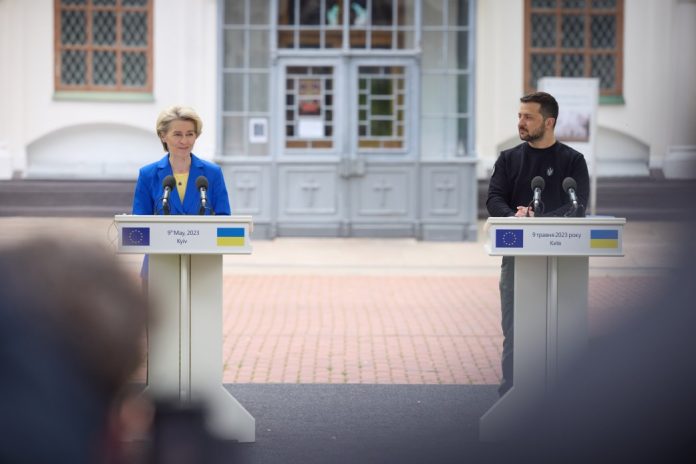European Union members are looking to launch new sanctions over Russia’s war in Ukraine that would target Chinese and Iranian firms and curb third country exports that defy current trade restrictions.
European Commission President Ursula von der Leyen unveiled the proposals during a trip to Kyiv on Tuesday, warning that if it transpired that goods going from the EU to third countries were ending up in Russia, member states could be asked to sanction such exports.
The proposed measures would be used cautiously as “a last resort”, she advised, while noting that the EU would stop transit via Russia of more of its exports, including advanced tech products and aircraft parts.
However, a quick decision is considered unlikely since opinions are divided. Some EU envoys reportedly feel the proposals aren’t harsh enough. Others are concerned about the potential damage to their international ties.
Sources have indicated that the draft proposal includes blacklisting multiple new companies from China, Iran, Kazakhstan and Uzbekistan. Moreover, in a bid to curtail the flouting of G7 Russian oil trading restrictions, tankers would be forbidden to offload on the high seas and would have to ensure their GPS trackers were switched off on entering ports.
Should all 27 EU countries agree to the new sanctions, it would be the 11th round of such measures since Russia invaded Ukraine in February 2022. It would also mark the first time China has been targeted over accusations about Beijing’s role in the war.
Speaking in Berlin where he had been meeting his German counterpart, China’s foreign minister declared Beijing would respond strongly should the EU take steps against Chinese companies doing legitimate business in Russia. Foreign Minister Qin Gang said Beijing has laws forbidding arms deliveries to crisis regions, and insisted that any “exchange and cooperation between Chinese and Russian companies” should not be interfered with.
Germany’s Foreign Minister, Annalena Baerbock, stressed that any sanctions would target specific companies that supply Russian arms manufacturers with critical components. “This is not directed at any specific country, but rather it is directed in particular at these sanctioned goods,” she told reporters.
Previous rounds of EU-imposed sanctions on Russia have targeted banks, companies and markets, plus parts of the sensitive energy sector. More than 1,000 officials are currently subject to asset freezes and travel bans.
This is the first time plans have been announced to target trade via other countries — other, that is, than the sanctions against Iranians alleged to be supplying drones to Russia.
According to one EU member diplomatic source, the estimated value of trade lost under the latest proposal would amount to about 500 million euros compared to the 11 billion euros von der Leyen said had been the total affected in the previous round.

